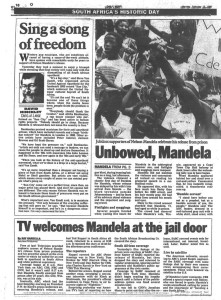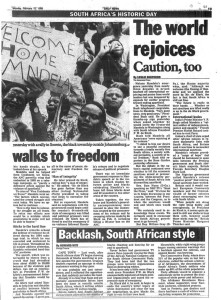By Dr Sue Onslow, Senior Research Fellow, Institute of Commonwealth Studies.
Twenty five years ago this week a triumphant Nelson Mandela walked free from Victor Vester Prison in Cape Town to a jubilant reception. The release of the ANC’s most prominent prisoner had been the consistent and shared objective of all Commonwealth leaders – although, as the growing number of comments in the Commonwealth Oral History project interviews underline, Mrs Thatcher’s detractors did not believe this at the time.
But how to cover this seminal event? In these days of 24/7 news coverage, it is easy to forget just how much the news-scape has changed in the past quarter century. Today, with a BBC TV News channel, a simple click permits live streaming. Back in February 1990, Mandela’s release presented the BBC World Service with an enormous logistical challenge. Indeed, Keith Somerville feels that reporting on President De Klerk’s announcement in the South African Parliament on 2nd February 1990 was a much easier sustained news story for the BBC to provide analysis and reportage. The news terrain of the global story of 11th February 1990 was very different. As we know, Mandela’s long-awaited appearance was late. John Carlin’s explanation in his biography, Knowing Mandela, was Winnie Mandela’s delayed arrival (because of her hair appointment in Johannesburg). Martin Plaut, the long-standing BBC World Africa editor, has a more cogent explanation: Mandela was so late because of a private heated argument with ANC top officials over just what Mandela would say in his first public statement for 27 years. The speech Mandela had prepared was vetoed behind the scenes by ANC officials, who gave him another to deliver.
For the BBC World news editors in London, this delay – and then Mandela’s stately progress to City Hall on the Grand Parade in the centre of Cape Town – was a logistical nightmare. Keith Somerville recalls: “They didn’t have the IT facilities to do a long rolling programme. It was incredibly hard to get network managers to bump programmes which were already in place, especially if these were very expensive. They couldn’t simply be pushed down the scheduling line. There was a complicated process of getting permissions to get them off air, and then shunted in the programming schedule to come back on air later. It ran over. Some guests had to leave.” The BBC World coverage was particularly affected given its reliance on radio, with transmitters coming in and out of signal range, which made rescheduling doubly difficult. The frantic work was therefore pressure to get schedulers to free up the schedule. Both Plaut and Somerville were non-plussed by both Mandela’s wooden delivery from the balcony of Cape Town City Hall and his recitation of long-established ANC nostrums. The revelation was Mandela’s press conference the following morning, twenty five years ago yesterday, at Archbishop Desmond Tutu’s Cape Town residence in Bishopscourt. There, Mandela, the political seducer and beguiler, won over the international press corps. The image of Mandela the Prisoner had been a potent one in the press; now, Mandela needed to manage the message in person, a key weapon in his continuing struggle with the apartheid government up until 1994.
Researchers should remember it is not simply what was said on and in the news. It is also how it was produced, and relayed. The stuff of history is humanity.
For more on the media and politics in Africa, see Dr Sue Onslow’s interview with Keith Somerville for the Commonwealth Oral History Project.
The Institute of Commonwealth Studies hosted a conference on ‘Nelson Mandela: Myth and Reality‘ in December 2014.


